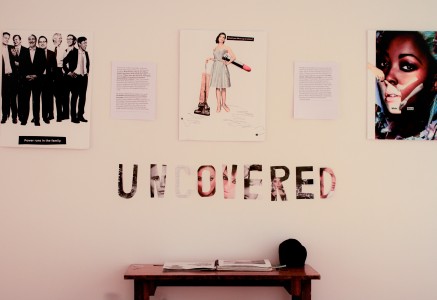“Holy biscuits, why do all of these models and actors look exactly the same?” Such are the questions posed by Hannah Kelley ’16, in her show “Uncovered,” on display this week in the Smith Gallery. Through a series of multimedia collages featuring magazine clippings and ink, Kelley reframes commonplace representations of femininity in new ways, crafting dysphoric compilations of disembodied limbs and hyper-sexualized advertisements that prompt viewers to think more critically about the media they consume. Kelley feels that her works serve to clarify the messages of objectification already present in most advertisements.
“I was infuriated, looking at all these images over and over, and it just wasn’t what I wanted to see. Then I thought I should just cut up these magazines and say what they’re really saying, put it out there and make it blunt, because I’m a very blunt person,” Kelley said. “The show’s about uncovering these messages.”
Kelley’s collages address the privileged representation of thin, white bodies in magazines that she noticed when she began working with magazines during her summer break. This early process of creation is on display in the form of Kelley’s sketchbook, which features her original collages intermingled with personal reflections and research notes on feminist scholars whose work influenced her process—among them Betty Friedan, Simone de Beauvoir and Susie Orbach.
“It was just an idea. I cut it out of a magazine, and I was like, ‘It’d be kind of cool if I did this,’ and then I was like, ‘Oh, I’m gonna do a whole bunch more,’ and I started doing like five a day. This was during the summer, before I came [back to Grinnell], just for fun. I had no idea I was going to do a show. Then it became really important to me … I had all these notes that I was taking … and I just wanted to show people in the end how the process happened.”
An intended studio art and gender, women’s, and sexuality studies double major, Kelley cites her classes outside the art department as being instrumental in her artistic development at Grinnell, noting the critical analysis of media and the ability to organize and articulate her thoughts as key components of her show. The process of creation was also personal, however, and often fraught with emotion.
“This was actually really hard for me to do sometimes. There was a lot going on in my life while I was making these which made it really personal, along the lines of eating or diets and body image and gender roles,” she said.
She likened the taxing process of looking at the images over and over to “brainwashing.”
“It was not fun, and that part was hard … so, I’d have to take a couple days off and just not think about it and look at other things, because I needed to be more attached to the real world,” Kelley said.
Ultimately, this alienation only fueled Kelley’s confidence in the necessity of her work. Through her show, she hopes to validate frustrations with the way femininity is represented in print media and prompt discussions of the feelings this can instigate.
“There is something wrong with it. It’s not just us, and we’re not crazy,” Kelley said.
There will be a closing reception for “Uncovered” on Friday, Jan. 31, at 4 p.m.


















































